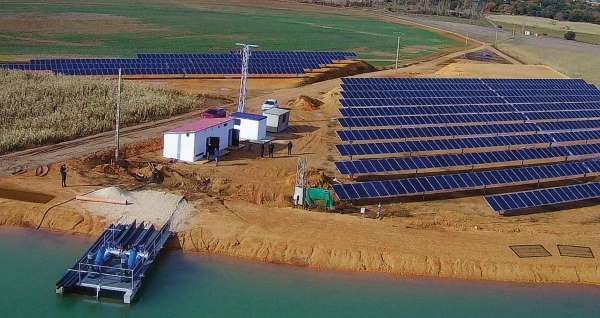Africa is not alone in the fight against climate change impact on the continent with the leading financial institution-AfDB advocating for a shift from hydro power generation to renewable capacitance amid dwindling water levels.
In the absence of reliable water to drive turbines at hydro power stations, a switch to wind, solar and other alternative sources was the alternative amid heightening climatic change crisis and in the absence of nuclear power on the continent, says Akinwumi Adesina, the President of the African Development Bank (AfDB) .
Dr. Adesina notes the need for transition to alternative sources of energy was a pragmatic decision than ever before as Africa continues grappling with the greenhouse gas emission concerns heightening.
There is a call for a switch to renewable energy as hopes for sustained energy from hydro power diminishes rapidly spurred by climate change.
It is imperative for Africa, he tells delegates at the ongoing COP 27 to look at alternative sources of energy and tap into wind, solar, geothermal, gas, among other options citing the increasing number of power deprived of the ‘insufficient; hydro power generated on the continent
Estimates by the continent’s power regulator-the Association of Power Utilities of Africa or ASEA (Association des Sociétés d’Electricité d’Afrique-its French name). Africa’s power demand averages 700 terawatt-hours (TWh), with the North African economies and South Africa accounting for over 70%.
The total technical hydropower potential of Africa averages 1 750 TWh, representing about 12 percent of the global capacity. A paltry 5 percent of this technically feasible potential is exploited, according to data from the regulator.
On the contrary, of Africa’s 600 million inhabitants, about half the continent’s population, lack access to electricity; some 900 million have no access to clean cooking fuels and technologies.
This is a shortfall that forces the Pan African bank to call for industrialization to bolster capacity and induce the energy mix to reach out to the majority ‘have nots’.
“Africa must industrialise and allow the energy mix,” he says while envisioning and increment rather than leapfrog towards renewable capacitation given variables in economies.
Regrettably, Africa has for long relied on hydro power at the expense of alternative investments into other sources noting that although countries are in a hurry to shift hasty from coal to gas or other options, the process should be graduas.
There be careful studies undertaken on the real returns but cautious of the climate change on energy.
The AfDB chief while supporting the cause on the African Common Position on Energy Access and Just Energy Transition adopted on 22 July this year by the African Union (AU) Executive Council.
It remains a responsibility for all to think again and plan for a shift to renewable as the ultimate given the ‘ugly devastations caused on the continent by the recurring climate change’.
And the AU Commissioner for Infrastructure and Energy Amani Abou-Zeid, throws his weight towards AfDB’s renewable energy vision and that the continent had a right to a “differentiated path towards the goal of universal access to energy by ensuring energy security for the continent continent and strengthening its resilience.
This should however be done with caution with the call for respecting the planet through improving the energy mix.”
UN Secretary-General António Guterres remains a champion and has sustained his advocacy for significant investments in renewables as Africa continues being clouded with greenhouse gas emissions.
Mr. Guterres had last September reiterated the call for cautious approach to environmental shortcomings that heighten disasters and called for ‘addition to fossil fuels.
“The world must end its addiction to fossil fuels,” he challenged African leaders to plan ahead for inclusion of renewable energy in their power grids as a matter of urgency.
“Leaders in business, as well as government, must stop thinking about renewables as a distant project of the future. Without renewables, there can be no future.”
The world must end its “addiction to fossil fuels,” he declared. “Leaders in business, as well as government, must stop thinking about renewables as a distant project of the future. Without renewables, there can be no future.
UN Secretary-General’s five-point plan
The UN chief has an ambitious five point plan to help transition to renewables. Achieve a fair and accelerated energy transition, which requires “patents that can be made freely available — especially those relating to battery and storage capacity,” he stressed.
Increasing and diversifying renewable energy technology supply chains, which are currently “concentrated in a handful of countries.” He said pertinent technologies should be considered “global public goods” and readily available to all.
Putting “policies and frameworks in place to incentivize investments and eliminate bottlenecks caused by red tape, permits and grid connections.”
Shifting fossil fuels subsidies to renewables. The $500 billion spent annually to lower the price of fossil fuels “more than triple what renewables receive…if we channel these resources and subsidies to renewables, we not only cut emissions, we also create more decent and green jobs,” he argues.
He calls for investment of up to $4 trillion in renewable energy projects. He notes that despite Africa being endowed with substantial renewable energy potentials, it currently receives just 2 per cent of clean energy investments.
Late UN Secretary General Koffi Anani was apt in his desire for Africa to be ‘energy sufficient’ . His premonition that ‘300 million people chiefly in Africa will still lack access to current power connectivity trends by 2040’ is seemingly coming to pass.
He had envisioned that both the poor and the rich should equal access to energy to fight poverty.
In his ‘Energy Africa’ campaign in London, prior to his demise he had candidly argued: “This generation of African leaders has a unique opportunity to deliver on the promise of energy for all.”
Under the Millennium Development Goals (SDGs) target number 7, it is desirable that Africa do connect close to 90 percent of its increasing population, though seemingly unattainable as climate change continues to sweep the continent.
The Common Market for Eastern and Southern Africa, with a membership of 21-countries seeks sustainable regional market to deepen regional integration but lacks enough energy to cover all nations and allow for cross border trade, growth their agriculture capacity for food sufficiency
Last May, Chairperson of the Regional Association of Energy Regulators for Eastern and Southern Africa (RAERESA) Mr. Daniel Bargoria, had regretted the energy shortfall among member states.
Plans are underway to improve the transmission capacity across borders, but that the same is not enough to secure unimpeded trade across the countries and regions.
Mr Bargoria, who is also the Executive Director of the Kenya Energy and Petroleum Regulatory Authority (EPRA), told delegates to the 11th Annual General Meeting of RAERESA called for improved infrastructure to interconnect.
Better energy infrastructure facilitates relations between countries, stimulating integration of the productive sectors as it brings close together economic spaces, reduces and/or eliminates the physical barriers to trade and transport costs and expands the market size.
Recent studies have shown that many African countries suffer power shortages and regular interruptions to services. For example, African countries are estimated to lose 12.5% of production time compared to 7% for South Asia owing to power outages thus suppressing countries production.
Dr. Bogoria, calls for an aligned regulatory framework to stimulate investments in power production and transmission.
“For reasons of sustainability, it is also necessary to stimulate production from renewable energy sources, for which the COMESA region has expansive potential, in terms of solar, wind, geothermal, bioenergy, among others,” he said.
And speaking at the same occasion, COMESA Assistant Secretary General for Programmes, Dr Kipyego Cheluget observed that trade in energy was as critical and beneficial as trade in goods and other services.
“Energy trade allows all nations to benefit from their comparative and competitive advantages and from the advantages of the economies of scale and scope,” he said. “The power sector should be open for private sector investment and ownership.”
He stressed the need for development of a harmonized regulatory framework to enhance sustainability of the regional energy market.
This initiative will provide an enabling environment for the needed investments, power trade and promotion of renewable energy and energy efficiency to thrive.









